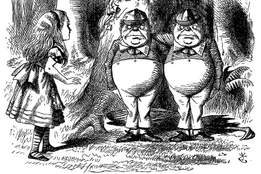
‘Shellacking’
Lookups for shellacking spiked during this year’s Super Bowl. For most of the game, the Philadelphia Eagles dominated the Kansas City Chiefs, who despite their best efforts just could not cut the mustard.
Back in the building where his NFL coaching career began, Fangio won his first career Super Bowl title as the defensive coordinator of the Philadelphia Eagles. And this performance, a 40-22 shellacking, may have been his masterpiece.
— Luke Johnson, The (New Orleans) Times-Picayune, 10 Feb. 2025
We define the noun shellacking as “a decisive defeat.” It comes from the verb shellac, which originally meant “to coat with shellac” or “to varnish”; it came to mean “to defeat decisively” in the early 20th century. The noun shellac can refer to purified lac (a resinous substance secreted by a scale insect) or a preparation of lac dissolved in alcohol and used chiefly as a wood filler and finish.
‘Humble’
Humble was another word that saw a surge in lookups during the Super Bowl, likely because it is the name of a song by halftime performer (and Pulitzer Prize winner) Kendrick Lamar.
On Sunday, NFL fans and the entertainment world came together to witness an electrifying performance from the Grammy-winning artist at the Caesars Superdome, where Kendrick Lamar performed a number of his hit tracks, including “Not Like Us,” “Humble” and more.
— Geca Flores, Athlon Sports, 11 Feb. 2025
To be humble, according to our definition, is to not be arrogant, assertive, proud, or haughty. The word humble comes (via Middle English and Anglo-French) from the Latin adjective humilis, meaning “low” or “humble,” which in turn comes from the noun humus, meaning “earth.”
‘Checks and balances’
Checks and balances has been among the top lookups this past week.
The lawsuit against DOGE in New York could pose a fundamental test of the rule of law and of the power of the executive against the checks and balances—like the courts and Congress—at the core of U.S. government. In their suit, the attorneys general argued that the president cannot unilaterally grant “unfettered access” to secure systems that were previously accessible only to a limited number of career civil servants with security clearances. “The president does not have the power to give away our private information to anyone he chooses, and he cannot cut federal payments approved by Congress,” they wrote in a statement. “This level of access for unauthorized individuals is unlawful, unprecedented and unacceptable.”
— Hurubie Meko and Benjamin Weiser, The New York Times, 11 Feb. 2025
We define checks and balances as “a system that allows each branch of a government to amend, override, or veto acts of another branch so as to prevent any one branch from exerting too much power or power beyond its authority.” More broadly, checks and balances also refers to a system in which power and control are distributed and counterbalanced (as to prevent unethical or harmful actions).
‘Quid pro quo’
Lookups for quid pro quo were high following the resignations of five Justice Department officials who refused to drop charges against New York City mayor Eric Adams.
Manhattan’s top federal prosecutor, Danielle Sassoon, and five high-ranking Justice Department officials resigned Thursday after she refused an order to drop corruption charges against New York City Mayor Eric Adams—a stunning escalation in a dayslong standoff over the Trump administration prioritizing political aims over criminal culpability. Sassoon, a Republican who was interim U.S. attorney for the Southern District of New York, accused the department of acceding to a “quid pro quo”—dropping the case to ensure Adams’ help with Trump’s immigration agenda—and said she was “confident” the Democratic mayor committed the crimes spelled out in his indictment, and even more. Before the showdown, Sassoon said, prosecutors had been preparing to charge Adams with destroying evidence and instructing others to destroy evidence and provide false information to the FBI.
— Larry Neumeister et al., The Associated Press, 14 Feb. 2025
Quid pro quo means “something given or received for something else.” There is nothing inherently illegal in giving or receiving something in exchange for something else, but in legal contexts quid pro quo often refers to something that is in fact illegal, such as if a company gives a government official money in exchange for receiving a contract that rightly should be given to whatever company is best able to meet the requirements for the contract.
‘Love’
Lookups for love were high this week, likely in anticipation of Valentine’s Day.
During the Middle Ages, Europeans believed that apples had aphrodisiac qualities and used them in love rituals. If a woman wanted a man to love her, she would sleep with an apple under her arm and persuade the man to eat it the next day. After he ate the apple, it was believed he would fall in love with her. Someone looking for love might consider that before Valentine’s Day.
— Jennifer Miller, The Augusta (Georgia) Chronicle, 12 Feb. 2025
We can’t tell you what love means, but we can tell you what the word love means. Actually, it has many meanings, including “the score of zero (as in tennis),” “warm attachment, enthusiasm, or devotion” (as in “love of the sea”), and—perhaps most relevant for the holiday—“affection and tenderness felt by lovers.” Love traces all the way back to the Old English word lufu, which itself shares an ancestor with the Old English word lēof, meaning “dear,” and the Latin verb lubēre, meaning “to please.”
‘Galentine’s Day’
Galentine’s Day was a top lookup on Thursday, Galentine’s Day.
Gather your (girl)friends, pop that champagne and celebrate Galentine's Day which, according to its founder is “only the best day of the year.” After a long and dreary January, February, the month of all things love is a welcome respite, and love is not just limited to your significant other or partner. It can be with and for anyone. While Galentine’s Day is a relatively newer holiday, compared to Valentine’s Day, the increasingly popular holiday presents a special way to tell your pals and gals you appreciate them.
— Saman Shafiq, USA Today, 13 Feb. 2025
Galentine’s Day is a holiday observed on February 13th as a time to celebrate friendships especially among women. The word Galentine’s Day—a blend of Valentine’s Day and gal—was introduced to the world by the chipper and dedicated Leslie Knope, the fictional Deputy Director of the Parks and Recreation Department of the also-fictional city of Pawnee, Indiana, in the NBC comedy Parks and Recreation, which ran from 2009 to 2015.
Word Worth Knowing: ‘Brachiate’
Certain members of the ape family, such as the gibbon, have the ability to brachiate, that is, to propel themselves by grasping hold of an overhead tree branch (or other projection) and swinging the body forward. (Chimpanzees, gorillas, and orangutans are less likely to travel in this manner, due to the weight of their bodies; when they do, it is only for very short distances.) The word for this action, brachiate, comes from bracchium, the Latin word for “arm.” Brachiate shares etymological ancestors with such words as bracelet (an ornamental band or chain worn around the wrist) and brachiopod (a category of marine organisms with armlike feeding organs called lophophores). Another relative is pretzel. That word’s German root, Brezel, is related to the Latin brachiatus, meaning “having branches like arms.”




